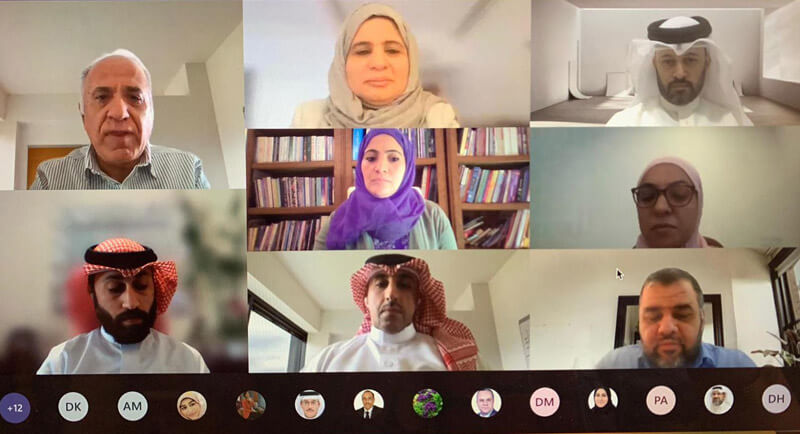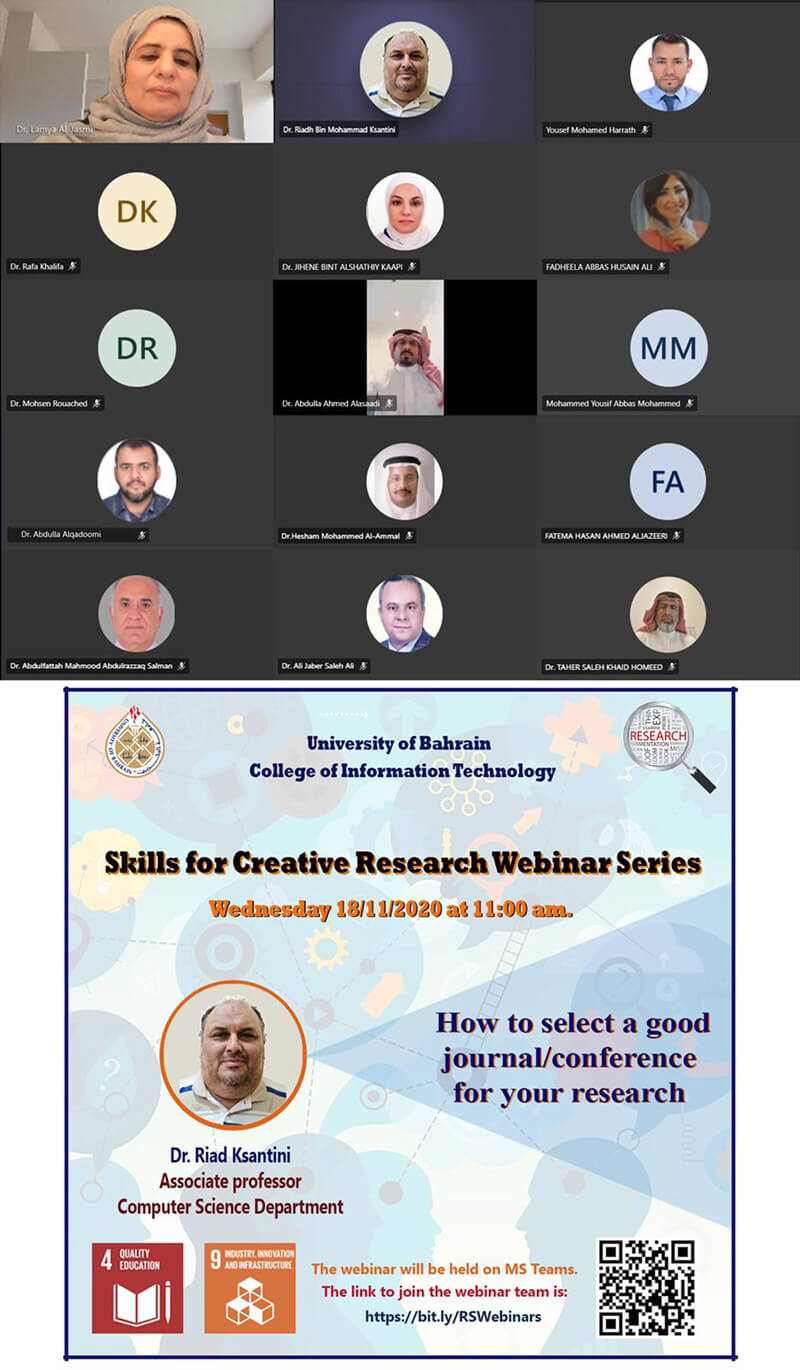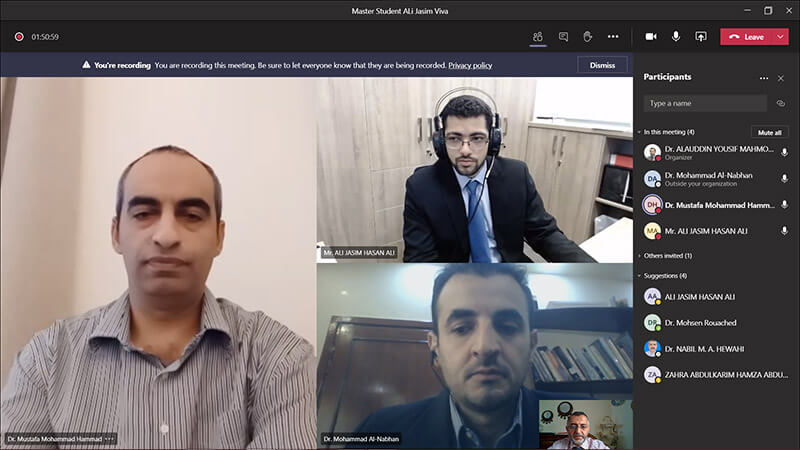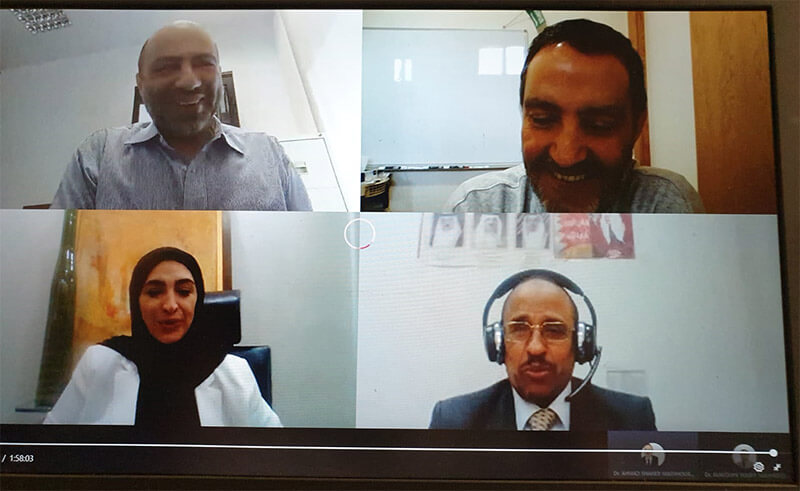NEWS
In A Symposium Discussing

In A Symposium Discussing
“Technical Expertise in Using Learning Management Systems in Light of the
Pandemic”
Information
Technology Professors at UOB Discuss Distance Learning Strategies
A symposium entitled “Technical
Expertise in Using Learning Management Systems in Light of the Covid-19 Pandemic”
was organized by the College of Information Technology at the University of
Bahrain (UOB) to discuss the best practices of learning and teaching
information technology in light the covid-19 pandemic, in which information
technology professors discussed effective teaching strategies and the technical
factors for the success of distance teaching.
The IT professors discussed
topics including effective class project teams using Microsoft Teams, as well
as electronic support meetings and their impact on student achievement.
The assistant professor in the
Department of Computer Science, Dr. Faisal Abdulhameed Al-Qaid, spoke in the
symposium on “Effective Strategies for Teaching on Online Platforms”
??and stressed that “teaching via online platforms using learning
management systems provides us with new opportunities to deal and interact with
students, therefore we must use them well and in a correct manner for the
education process to be done effectively.”
In this context, Dr. Al-Qaid
stated that “The Corona pandemic has changed traditional teaching methods and
the way students are dealt with through learning management systems, calling
for the investment of modern technical means in several areas.”
Also, the Assistant Professor in
the Department of Computer Engineering, Dr. Jalal Mohammed Khlaifat, spoke on
“Giving Lectures Through Smart Devices.” As Dr. Khlaifat believed that
“the experience of distance teaching through smart devices was an
effective experience, as all students were able to see watch live lectures
while easily activating the feature of interaction between the professor and
students. The study compared the distance education systems currently in use at
UOB, and tried to identify the compatibility of many of their properties with
smart devices to obtain the best practical experience for distance learning
using smart devices, ” in addition to reviewing a number of modern devices
that are compatible with e-learning.
Moreover, Assistant Professor in
the Computer Engineering Department, Dr. Mohammed Abdulaziz Al-Mir,
participated in the symposium and spoke about “Effective Class Project
Teams: An Experiment with Microsoft Teams”. Dr. Al-Mir stated that “These
projects faced challenges after the transition to distance education, including
forming teams, activating individuals in such teams, preparing electronic
resources to facilitate the work of these teams, and the lack of experience of
some students in using the educational platform and electronic resources,”
explaining that these challenges formed an obstacle for students and a fear of
remote interaction.
Furthermore, Dr. Al-Mir spoke on
the experience of using Microsoft Teams and said: “We have taken measures to
activate the teams, among which is the inclusion of student interaction in the
team’s channel in the final evaluation of the student, which necessitated
urging students to use a private channel for all their activities, including discussions,
meetings, and exchange and storage of resources.
For his part, Assistant Professor
in the Department of Computer Science, Dr. Abdullah Mohammed Al-Qaddumi,
reviewed the experience of “Electronic Support Meetings and Their Impact
on Students’ Achievement in Distance Learning.” In this regard, Al-Qaddumi
said, “I worked on scheduling daily meetings with students in the evening,
through advance appointments and e-mails to help them and provide them with the
necessary support through the Microsoft Teams platform.” Dr. Al-Qaddumi
indicated that he experienced a positive interaction among the students, which
appeared in the attendance, as well as in asking questions and discussions,
stressing that the virtual communication platforms provided the appropriate
environment for discussion among members, making virtual support sessions
simulate the experience of real classes.
On her part, Assistant Professor
at the Department of Information Systems, Dr. Jihene Bint Al-Shathaly Kaabi,
spoke about the technical aspects that helped her succeed in teaching online,
as she stated that “There are several technical aspects that professors should
take into account in distance education, which are, considering the target
group of students when preparing the content of the live session, as it is
necessary to ensure students’ ability to understand the content of the lesson,
and to ensure that the session is presented clearly.” Pointing out that
providing an outline of the lesson at the start of the session is essential.
Also, Kaabi called on the
professors to “Encourage students to participate during the session
through the chat activation feature available in all e-learning platforms, so
that the professor can discuss students’ answers and give practical advice to
each student on his answer. “
Moreover, Dr. Kaabi stressed the
need to respect the meeting dates, timely answer students’ questions outside
lecture times, and to provide assistance to every student who needs support.
It’s worth mentioning that the Symposium
was moderated by Assistant Professor at the Department of Computer Science, Dr.
Abdulfattah Mahmood Salman, which was the second in a series of virtual symposiums
organized by the College of Information Technology in light of the Covid-19
pandemic, to discuss best practices for remote learning and teaching of
information technology.
Sustainable Development Goals
4 Quality education
17 Partnerships for the goals
Key Words
The College of Information
Technology at the University of Bahrain, University of Bahrain, Technical
Expertise in Using Learning Management Systems in Light of The Pandemic,
effective strategies for teaching through online platforms, the traditional methods
of teaching,













